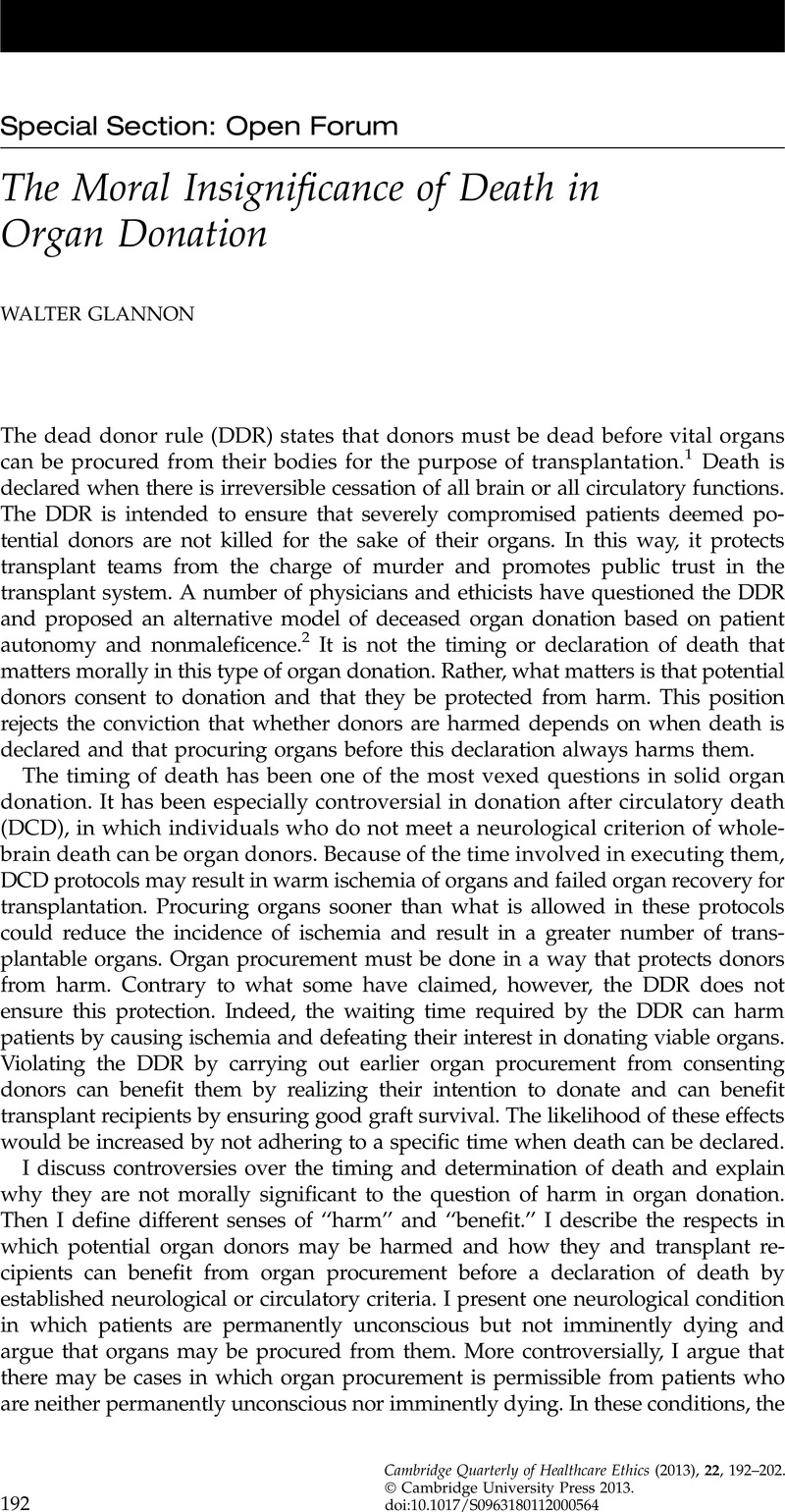Article contents
The Moral Insignificance of Death in Organ Donation
Published online by Cambridge University Press: 14 March 2013
Abstract

- Type
- Special Section: Open Forum
- Information
- Copyright
- Copyright © Cambridge University Press 2013
References
Notes
1 Robertson, J.The dead donor rule. Hastings Center Report 1999;29(6):6–14.CrossRefGoogle ScholarPubMed
2 E.g., Arnold, R, Youngner, S.The dead donor rule: Should we stretch it, bend it, or abandon it? Kennedy Institute of Ethics Journal 1993;3:263–78CrossRefGoogle ScholarPubMed; Veatch, R.Abandon the dead donor rule or change the definition of death? Kennedy Institute of Ethics Journal 2004;4:261–76CrossRefGoogle Scholar; and Truog, R, Miller, F.The dead donor rule and organ transplantation. New England Journal of Medicine 2008;359:674–5.CrossRefGoogle ScholarPubMed
3 Report of the Ad Hoc Committee of the Harvard Medical School to Examine the Definition of Brain Death. A definition of irreversible coma. JAMA 1968;205:337–40.
4 See Steinbrook, R.Organ donation after cardiac death. New England Journal of Medicine 2007;357:209–13CrossRefGoogle ScholarPubMed; and Bernat, J.The boundaries of organ donation after circulatory death. New England Journal of Medicine 2008;359:669–71.CrossRefGoogle ScholarPubMed
5 Bernat, J, D’Alessandro, A, Port, F, Bleck, T, Heard, S, Medina, J, et al. . Report of a national conference on donation after cardiac death. American Journal of Transplantation 2006;6:281–91.CrossRefGoogle ScholarPubMed
6 Bernat, J.The debate over death determination in DCD. Hastings Center Report 2010;40(3):3.CrossRefGoogle ScholarPubMed
7 Bernat, J, Capron, A, Bleck, T, Blosser, S, Bratton, S, Childress, J, et al. . The circulatory-respiratory determination of death in organ donation. Critical Care Medicine 2010;38:963–70, at 967.CrossRefGoogle ScholarPubMed
8 See, e.g., note 2, Veatch 2004, at n1.
9 Jennett, B.The vegetative state. Journal of Neurology, Neurosurgery and Psychiatry 2002;73:355–6CrossRefGoogle ScholarPubMed; and Blumenfeld, H.The neurological examination of consciousness. In: Laureys, S, Tononi, G, eds. The Neurology of Consciousness: Cognitive Neuroscience and Neuropathology. Amsterdam: Academic Press; 2009:15–30.CrossRefGoogle Scholar
10 See Feinberg, J.Harm to Others. New York: Oxford University Press; 1986.Google Scholar
11 Rodriguez-Arias, D, Smith, M, Lazar, N.Donation after circulatory death: Burying the dead donor rule. American Journal of Bioethics 2011;11(8):36–43, at 40.Google ScholarPubMed
12 See note 11, Rodriguez-Arias et al. 2011, at 41.
13 See note 11, Rodriguez-Arias et al. 2011, at 41.
14 Luaute, J, Maucort-Boulch, D, Tell, L, Quelard, F, Sarraf, T, Iwaz, J, et al. . Long-term outcomes of chronic minimally conscious and vegetative states. Neurology 2010;75:240–52.CrossRefGoogle ScholarPubMed
15 Miller, F, Truog, R, Brock, D.The dead donor rule: Can it withstand critical scrutiny? Journal of Medicine and Philosophy 2010;35:299–312CrossRefGoogle ScholarPubMed. See also Miller, F, Truog, R.Rethinking the ethics of vital organ donation. Hastings Center Report 2008;38(6):38–46CrossRefGoogle Scholar; and Miller, F, Truog, R.Death, Dying, and Organ Transplantation: Reconstructing Medical Ethics at the End of Life. Oxford: Oxford University Press; 2012.Google Scholar
16 Boly, M, Faymonville, M-E, Schnakers, C, Peigneux, P, Lambermont, B, Phillips, C, et al. . Perception of pain in the minimally conscious state with PET activation: An observational study. Lancet Neurology 2008;7:1013–20.CrossRefGoogle ScholarPubMed
17 Wilkinson, D, Savulescu, J.Should we allow organ donation euthanasia? Alternatives for maximizing the number and quality of organs for transplantation. Bioethics 2012;26:32–48, at 40–41.CrossRefGoogle ScholarPubMed
18 See note 15, Miller et al. 2010, at 306.
19 See note 2, Veatch 2004. See also Bagheri, A.Individual choice in the definition of death. Journal of Medical Ethics 2007;33:146–9.CrossRefGoogle ScholarPubMed
20 I thank an anonymous reviewer for helpful comments on an earlier version of this article. The writing of the article was supported by a research fellowship from the Brocher Foundation, Hermance, Switzerland, which is gratefully acknowledged. I thank the other researchers at the Brocher for their constructive comments and questions following a presentation on the issues discussed here.
- 9
- Cited by




